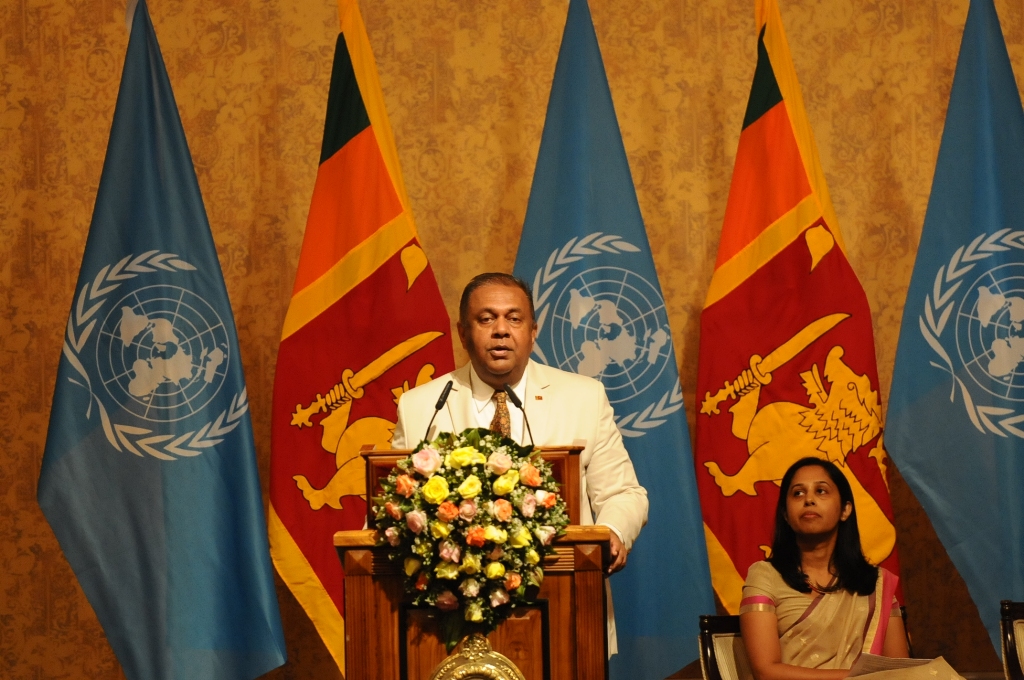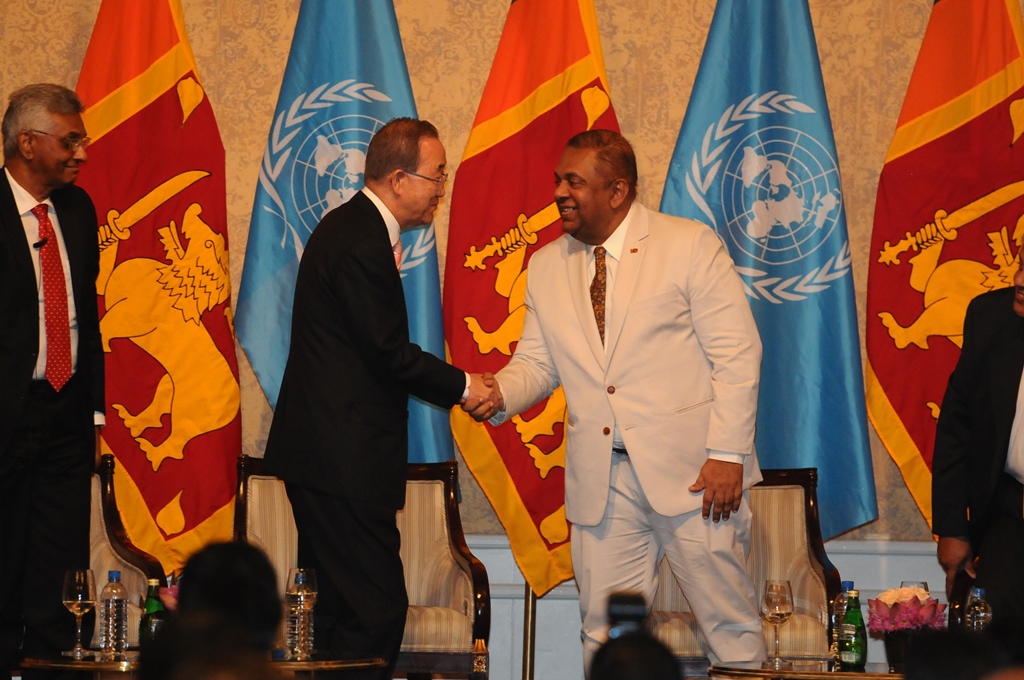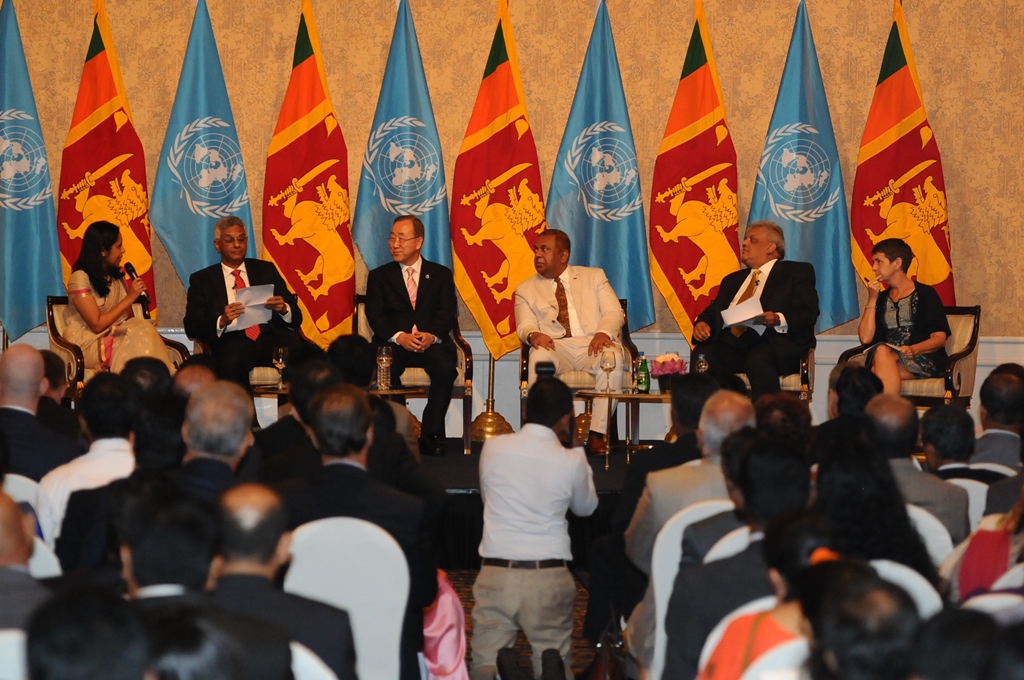

Sinhala Text (PDF) (DOC)
Tamil text to follow
Introductory Remarks by
Minister of Foreign Affairs, Hon. Mangala Samaraweera, MP.,
to Address by UN Secretary General Ban Ki-moon
organized by the Lakshman Kadirgamar Institute
Colombo, 1 September 2016
His Excellency Ban Ki-moon, Secretary-General of the United Nations
Madam Ban Soon-taek
Excellencies
Ladies and Gentlemen
The first Prime Minister of Sri Lanka to address the UN General Assembly since Sri Lanka was granted membership in the United Nations in 1955, Hon. S.W.R.D. Bandaranaike, articulated our intentions as a member of the UN, as follows:
“This is an Organisation which expresses itself most effectively by bringing to bear a certain moral force – the collective moral force and decency of human beings. That is a task in which the weak as well as the strong can render a useful service, and I give the assembly the assurance, on behalf of my country, that as far as we are concerned, every endeavour that we can make in all sincerity to assist in the achievements of those noble ideas for which this Organisation stands, will always be forthcoming in the fullest measure.”
Since joining the United Nations, Sri Lanka has contributed in numerous ways to the UN system including its norm setting process. Just five years since becoming a Member, Sri Lanka, then Ceylon, was elected as a non-permanent member of the UN Security Council. Many distinguished Sri Lankans have served with distinction at the United Nations and have held important positions in the UN and its agencies. Our diplomats have chaired important conferences such as the Law of the Sea Conference and presided over the General Assembly, and the Security Council, as well as numerous other UN Ministerial level Meetings.
However, the long years of conflict that plagued our country saw us veer away at times, from the path of giving effect to that moral voice. Following the end of conflict in 2009, Sri Lanka tread a path that was unfamiliar to many of us; even quarrelling with the United Nations Organisation itself. But the winds of change began to sweep across our nation on the 8th of January 2015, when the people of our country, staying true to their legacy of being Asia’s oldest democracy, took charge of their destiny and voted decisively to steer us back on course.
Today, under the leadership of President Maithripala Sirisena and Prime Minister Ranil Wickremesinghe, Sri Lanka stands firmly on the path of engagement and friendship with all nations; engagement and friendship with the world community; and engagement and friendship with the United Nations and its agencies, which have stood by our people and travelled with us in our journey, since Independence, both in good times and in bad.
Today, we are working to heal the wounds of our people who bear scars from years of conflict that has left no individual and no community untouched. We are taking our responsibilities towards our people and the international community with due seriousness, and as we work to promote understanding amongst our peoples, we also strive to work for the promotion of understanding and respect for each other, at a global level. We have set for ourselves a clear path towards reconciliation and for achieving equitable and sustainable development for all our people; to build a country that upholds the dignity of all, and stands firmly against the politics of ethnic and religious division.
Sri Lanka has realigned its policies with the principles enshrined in the Charter of the United Nations. By committing ourselves to the safeguarding of universal values and by respecting international system regulations that sustain global stability, Sri Lanka has shed its brief period of self-isolation which, no doubt, was an aberration in our long democratic journey.
We are now on a historic journey today to build a Sri Lanka that,
-safeguards, promotes and protects the rights and dignity of all, and equality of all;
-respects and celebrates the multi-ethnic, multi-lingual, multi-religious nature of our society;
-empowers our youth and our women;
-upholds the rule of law; respects democracy and fundamental freedoms including the freedom of the media;
-preserves our environment while taking steps to ensure integrated and equitable sustainable development;
-gives priority to securing the best education possible for our children and youth, including the skills they require to meet the demands of the global value chain;
-focuses on infrastructure development, and economic growth required for the prosperity of all our people;
-and enhances and encourages understanding and preservation of culture, respect for each other’s traditions and beliefs, and is always conscious of the need to be a responsible and respected member of the international community.
Ladies and Gentlemen,
Our Guest Speaker today, His Excellency Ban Ki-moon, is perhaps the world’s best known and most recognised personality, and does not need a lengthy introduction. Yet, perhaps a brief one would not be out of place.
I had the honour of first meeting Secretary-General Ban Ki-moon when he was the Minister of Foreign Affairs and Trade of his country. His generosity towards the people of Sri Lanka – the children’s hospital and the bridge in Matara – stand tall as icons etched in people’s hearts.
Mr. Ban Ki-moon was appointed as Secretary-General of the United Nations on 1 January 2007 and was unanimously re-elected by the General Assembly for a second term in 2011. He is the 8th Secretary-General of the UN and only the second from Asia to hold this important post.
During his tenure at the helm of the United Nations, he has devoted himself to actively mobilising world leaders around a set of new global challenges, from climate change and economic upheaval to pandemics and increasing pressures involving food, energy and water.
One of his first major initiatives was the 2007 Climate Change Summit, followed by extensive diplomatic efforts that have helped put the issue at the forefront of the global agenda, culminating in the ‘Paris Agreement’. I believe that this historic Agreement and the Sustainable Development Goals will stand as milestones achieved during His Excellency Secretary-General Ban Ki-moon’s tenure. Just yesterday, we were discussing about how much time and energy His Excellency has devoted to these noble goals, which we hope will be carried forward with the same vigour when the leadership of the United Nations passes on at the end of this year.
His Excellency advocated successfully for the creation of UN Women, a major new agency that consolidates the UN’s work in this area. His advocacy for women’s rights and gender equality has also included the "Unite to End Violence against Women" campaign, the "Stop Rape Now" initiative, the creation of a "Network of Men Leaders" and the establishment of a new Special Representative on Sexual Violence in Conflict. Within the UN itself, the Secretary-General has increased the number of women in senior management positions by more than 40 per cent, reaching the highest level in the Organization’s history.
The Secretary-General has also worked hard to strengthen UN peace efforts and has taken several important steps to improve the impact of the United Nations "blue helmets" operating in the world’s conflict zones.
Ladies and Gentlemen,
As you all know, this is Secretary-General Ban Ki-moon’s second visit to Sri Lanka, his first visit having taken place seven years ago in 2009. Throughout these 7 years, the Secretary-General maintained his advocacy for democracy, good governance, reconciliation, justice and human rights in our country – goals which the National Unity Government under the leadership of President Maithripala Sirisena and Prime Minister Ranil Wickremesinghe – share, and are determined to pursue for the benefit of all our peoples.
Secretary-General Ban Ki-moon’s visit at this juncture, along with Mrs. Ban Soon-taek is an honour and recognition for the people of our country who have taken bold decisions at elections, twice last year, and signifies the firm renewal of engagement between the United Nations and Sri Lanka.
Ladies and Gentlemen,
In my capacity as the Chairman of the Lakshman Kadirgamar Institute of International Relations and Strategic Studies, I now have the honour of inviting the Secretary-General of the United Nations, His Excellency Ban Ki-moon, to address this gathering.
* * *
Address by UN Secretary General (Text & Photographs)







